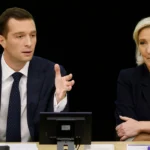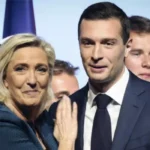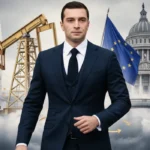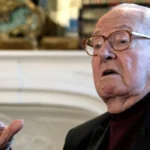This week we welcome Alexander Stubb, Finnish President since February 2024, former Prime Minister, former Minister of Foreign Affairs and former Member of the European Parliament. A little over a year ago, Finland joined NATO, ending decades of neutrality and military non-alignment. The war in Ukraine and the concerns it raised in Europe brought about this historic turning point.
Alexander Stubb believes that his country’s entry into NATO will bring “more added value” to the organization thanks to the “million Finns who have done their military service” and the country’s strategic position, which doubles NATO’s border with Russia. “NATO has gained a lot and Finland has gained too,” he emphasizes. If Finland “is not provocative” towards Russia, it aims to “be in the hard core of NATO”.
Alexander Stubb welcomes “very positively” the choice of appointing former Dutch Prime Minister Mark Rutte as head of NATO. “He will be a very good leader for NATO”, he rejoices, “I am very happy for him and for NATO”.
Together with Sweden, also recently joined NATO, and Norway, Finland has announced the creation of a military corridor in the Arctic, of great strategic importance for Helsinki. Alexander Stubb points out that without a connection to the Baltic Sea, Finland is cut off from the world and that it is therefore a security and economic issue.
For several months, Finland has closed its borders with Russia to the arrival of migrants, mostly from the Middle East and Africa, and accuses Moscow of orchestrating this migratory flow to influence Finnish politics. According to Alexander Stubb, “Putin is using people as an instrument, he is trying to destabilize Finland” and is waging “a hybrid war”. The Finnish president hopes to “find a solution that is secure and humane”.
The European Union (EU) officially launched accession negotiations with Ukraine on Tuesday. Finland, which had to cede 10% of its territory to Russia in 1940, “understands exactly what is happening in Ukraine at the moment and that is why we are giving quite strong support” to kyiv’s candidacy. The prospect of Viktor Orban taking over the EU presidency from 1 July and the possible consequences on the support of the 27 for Ukraine does not worry Alexander Stubb, despite the Hungarian Prime Minister’s displayed closeness to Vladimir Putin. “I believe that Ukraine’s path to the Union is clear,” says Alexander Stubb. The former Finnish Prime Minister remains optimistic, believing that despite the crises, “solutions are always found in Europe”. He cites the example of the financial agreement for aid to Ukraine that Viktor Orban had blocked before finally giving in under pressure from the 27.
He is also not worried about a possible second term for Donald Trump and its impact on transatlantic relations, which were nevertheless weakened during the Republican candidate’s first presidency in the American election. Alexandre Stubb says that Europe is essential for Washington because “the United States would like to remain a world power”. However, “to remain a global power, to counter China, we need alliances and the alliances are us, the Europeans”.
While the allocation of key EU positions is under discussion, Alexander Stubb praises the record of Ursula von der Leyen, “a great President of the Commission, a bit like Jacques Delors”. He supports her for a second term at the head of the European Commission, which would be “a good thing for Europe”. He also hopes that the President of the European Parliament Roberta Metsola will be reappointed and approves the choice of Estonian Prime Minister Kaja Kallas as the future new head of European diplomacy. “I am sure she will be a super good Minister of Foreign Affairs of Europe”, he says, because it is “very important to have a former head of state” in this position and “it is also good to find a balance between East and West”.
Alexander Stubb believes that in terms of geopolitical Europe, “we have made good progress over the last five years, but we must also understand that Europe is never perfect, never, especially because we have 27 Member States, from time to time, with slightly different interests”. At a time when multilateralism is in decline, he thinks that “regional integration will be stronger” and Europe will be “strong enough” in this new global context. “Europe is not going to be the United States, Europe is not going to be China, but something in between, and if we understand that, if we are not perfectionists, I think we will have a slightly more positive view of Europe”, he concludes.
This article is originally published on .france24.com






